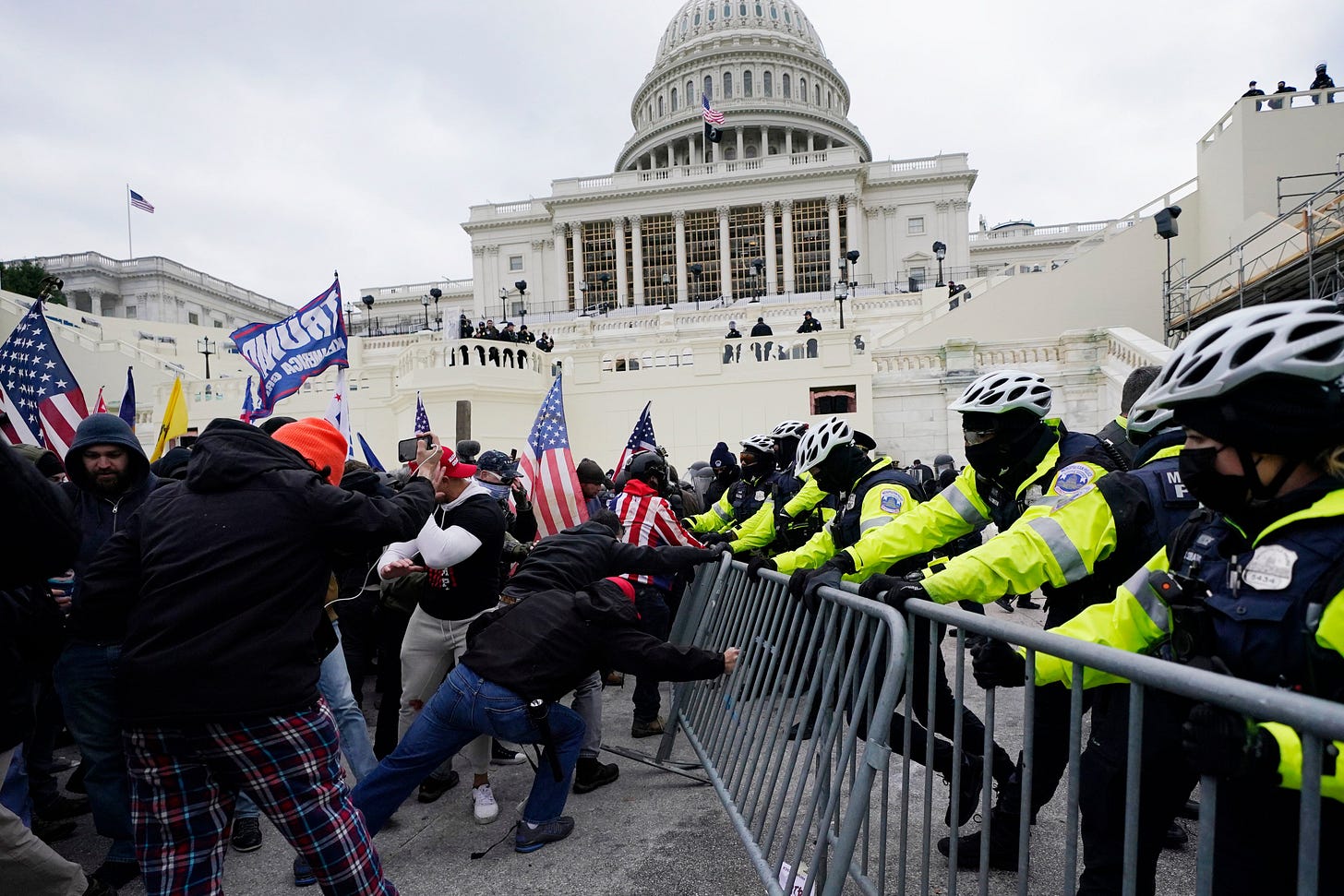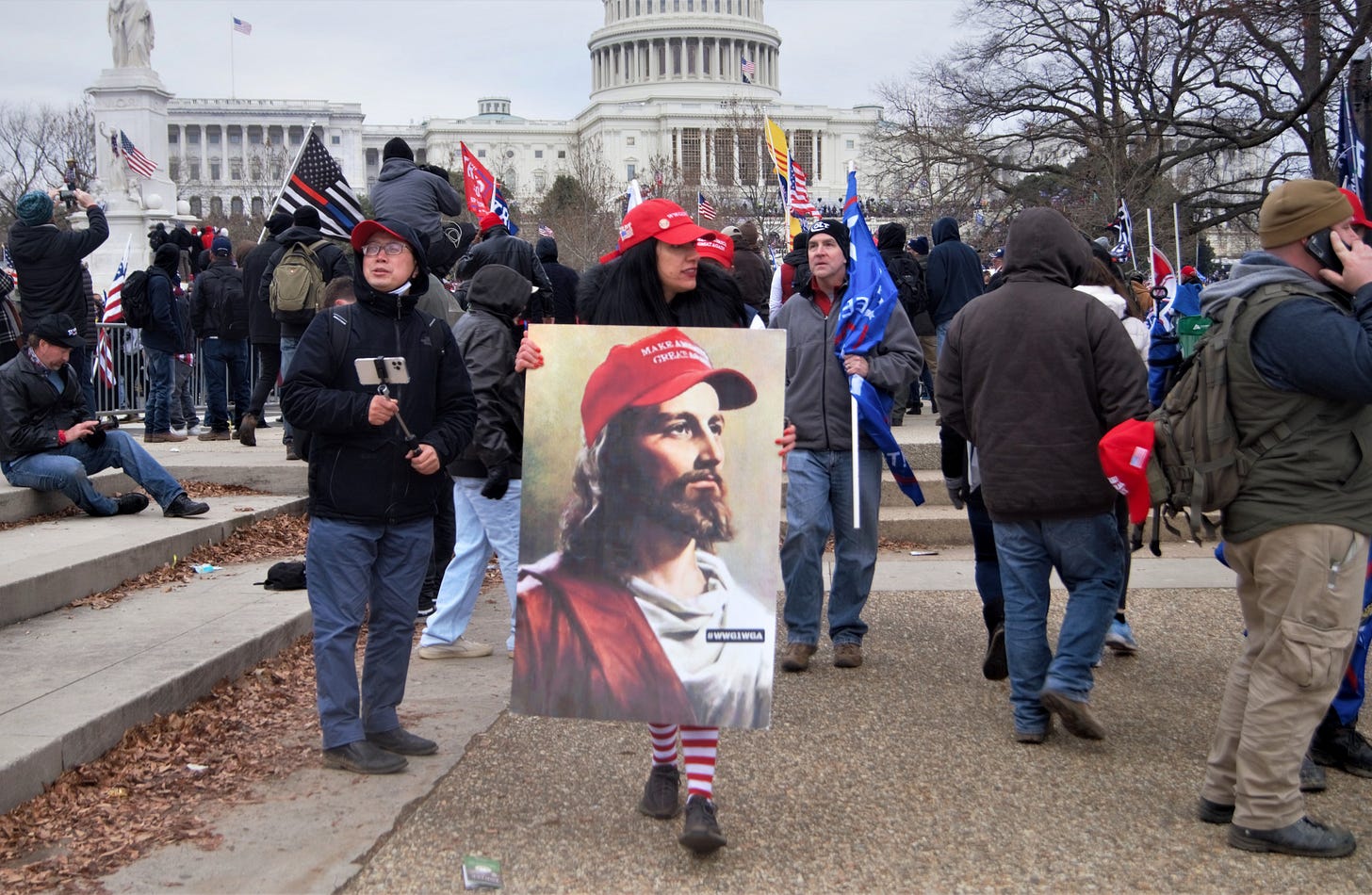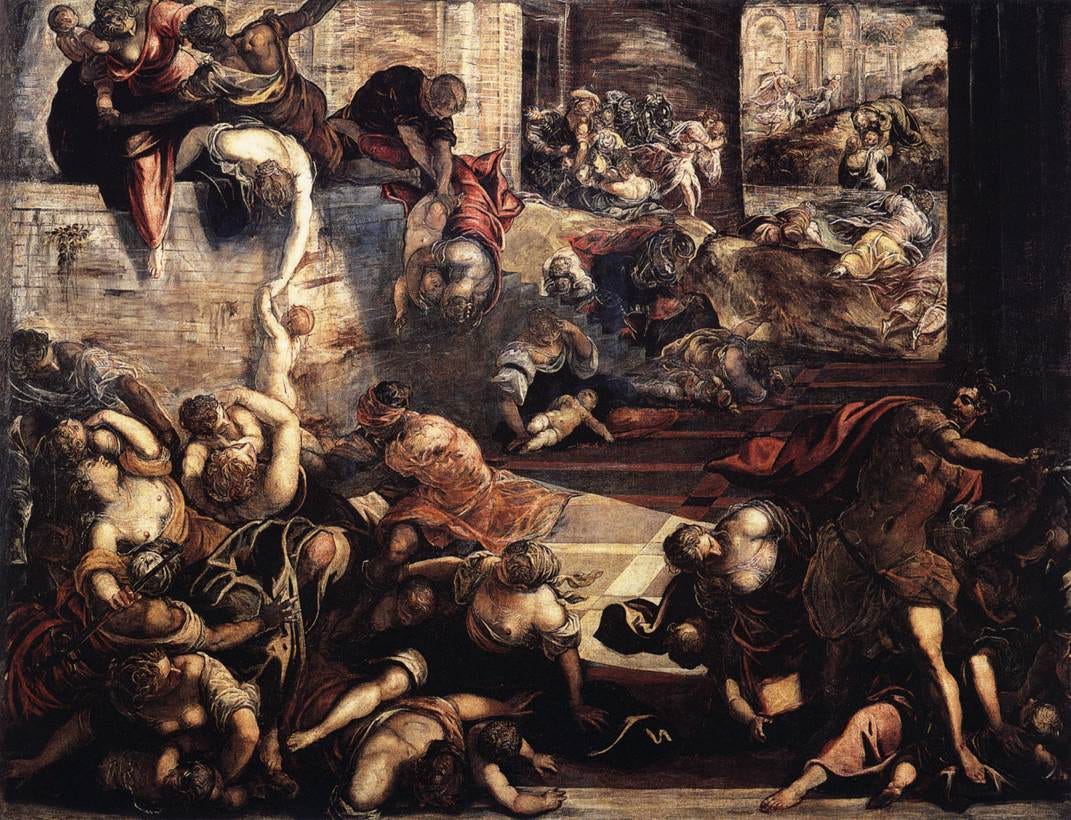Insurrection Epiphany
“Remember this day forever!”
Then-President Donald Trump tweeted that statement as darkness fell on Washington, D.C., on Jan. 6, 2021. At that moment, the U.S. Capitol police had yet to secure the grounds after insurrectionists stormed the Capitol at Trump’s urging. Multiple individuals had already died from the melee.
But it wasn’t with a mournful tone that Trump wanted people to remember the day. In that tweet — one of his last before losing his social media accounts — Trump again repeated lies about the 2020 election that he lost, claiming his “sacred landslide election victory” had been “so unceremoniously & viciously stripped away from great patriots” (but who knew that “patriots” shatter Capitol windows and poop in the hallways). Since then, the man who tried to flush American democracy continues to falsely insist that “the insurrection took place on November 3, Election Day. January 6 was the Protest!”
This week marks the first anniversary of Jan. 6. But most will not join Trump in marking that day as sacred. From official ceremonies at the Capitol to candlelight vigils across the country, people will mark with lament the worst attack on the Capitol since the British burned it during the “War of 1812” in 1814 (which is kind of like COVID-19 still being around in 2022).

Around the world, Christians will remember the day for another reason. For hundreds of years, generations upon generations of Christians have observed Jan. 6 as a holy day called “Epiphany.” This occasion most commonly involves reflecting on the story of the magi in Matthew’s narrative of Jesus’s birth. Thus, Jan. 6 is also known as “Three Kings’ Day.” And while many U.S. churches today still sing about those mysterious figures “bearing gifts” who choose to “traverse afar,” the liturgical tradition of Epiphany has long helped Christians praise the “King forever, ceasing never, over us all to reign.”
That both Epiphany and the quadrennial congressional counting of electoral college votes occur on Jan. 6 remains a coincidence. However, as the anniversary of the violent insurrection approaches this week, the conjuncture of those two moments offers a unique opportunity for American Christians to reflect on our faith in relation to political power.
In this issue of A Public Witness, we journey back to the events of Jan. 6 with a focus on the co-opting of Christian symbols and values. Then we look at the gift of Epiphany’s message and how it can help us find a new way home after the insurrection.
‘Very Beautiful Time’
During a congressional hearing in May, U.S. Rep. Andrew Clyde, a Republican from Georgia, tried to downplay the insurrection. While the attempts to rewrite history started with Trump before Capitol police even secured the premises, Clyde took things to a whole new level.
“You know, if you didn’t know the TV footage was a video from January the 6th, you would actually think it was a normal tourist visit,” the congressman said without even blushing.
Not to be outdone, the guy who lost the election and then lost the coup attempt called Jan. 6 “a very beautiful time with extremely loving and friendly people.” In less than four years, we went from “very fine people on both sides” of the deadly White Supremacist rally in Charlottesville, Virginia, to lavishing praise on the supposedly loving and friendly Confederate flag-waving people who sent police officers to the hospital and morgue.
Since then, things have only gotten worse.
A new poll by the Washington Post and the University of Maryland found that while most Americans say Trump bears a “great deal” or “good amount” of blame for the attack, only 27% of Republicans agree. Why so low? Because they’ve bought Trump’s lies that led to the insurrection in the first place. The same poll found 62% of Republicans think there is evidence of widespread election fraud (even though there isn’t) and 58% of Republicans say Joe Biden wasn’t legitimately elected president (even though he was).
But the numbers get even scarier when looking at questions about violence. Thirty-six percent of Republicans claimed the insurrectionists on Jan. 6 were mostly peaceful, while only 26% called them mostly violent. Yet, about 140 law enforcement personnel were injured in the clearly violent attacks (which is many more than harmed by tourists).

Unfortunately, many Christians have put on the red hats and adopted the conspiracy theories. PRRI found that most White evangelicals actually blame liberal/left-wing activists for the insurrection instead of White Supremacists or Trump. Additionally, 61% of White evangelicals falsely think the 2020 election was stolen, 25% are QAnon conspiracy believers, and 33% believe that “true American patriots may have to resort to violence in order to save our country.”
Thus, we fear the one-year anniversary won’t just bring solemn remembrances of those who died and the deplorable attempt to kill our democracy. Some instead want to pretend nothing happened or glorify what transpired. Trump will even give a press conference that day to presumably further whitewash what he did and again claim he should be in the Oval Office. And he’s scheduled his remarks at Mar-a-Lago to compete with a prayer service at the Capitol.
So, let’s be clear about what occurred. Go back and watch the footage if you need a refresher. A violent pro-Trump mob stormed the Capitol after Trump told them to “walk down to the Capitol” to “stop the steal” and “fight.” And fight they did.
Five people died — and four police officers later committed suicide. The Capitol suffered more than $1.5 million in damage, and some irreplaceable historic items were badly damaged. It delayed the certification of Biden’s win until the early hours of the next day. And it represented a significant attack on the very heart of American democracy — an attack that continues as state politicians pass laws to limit ballot access based on false claims about the 2020 election.
All of this, we must also remember, was done in God’s name. Many insurrectionists carried Bibles, Jesus signs, and Christian flags. Too many Christians echoed Trump’s lies as gospel and then baptized the violent insurrection as a holy crusade. To counter this heresy of Christian Nationalism, we must accurately remember what happened on Jan. 6 — and what happened some 2,000 years earlier.
Herod’s Epiphany
There’s a sad irony in Christians participating in political insurrection on the day of Epiphany. A raw attempt to maintain power on behalf of a political ruler unfolded on the liturgical day Christians celebrate the revelation of Jesus’s identity as transcending any single nation.
Traditionally, Epiphany is the climax of the Christmas season. The “12 days of Christmas” historically didn’t count down to Dec. 25 but instead mark the time between Jesus’s birth and the visit of the magi. Our consumerist culture today stops celebrating Christmas and starts taking down decorations once Christmas Day passes (apparently we’ve lost the “war on Christmas” after all).
Epiphany expresses an essential meaning of Christmas: Jesus’s birth represents a shaking up of the world order. God coming down to Earth unsettles those who claim to be in control of temporal affairs. The magi, political outsiders from a competing kingdom, traveled to pay homage to a new king, which provoked a reaction from the man whom the Roman Senate had declared “king of the Jews.” As Matthew’s Gospel put it, “When King Herod heard this he was disturbed, and all Jerusalem with him.”
“Herod was scared of a newborn baby. This basic fact of the Epiphany story bears the key to understanding its political implications,” explained Rev. John Allen back in 2013. “A newborn that three foreign men called a king suddenly becomes a massive threat, not to Herod’s life or his infrastructure or his military, but to the image he has cultivated as the sole ruler, the only king.”
Placed in power with foreign assistance, Herod faced questions of legitimacy. He thought creating beautiful buildings made him great, but he remained insecure and paranoid. So, the arrival of Jesus creates a political crisis.
The biblical writers invoked clearly political terms to play up the rivalry. As Bruce Chilton, a professor of religion at Bard College and author of the book The Herods, recently explained on Dangerous Dogma, the New Testament “uses language which can clearly be construed to be directly oppositional to the Roman Empire.” Chilton noted that terms like “God’s son” or “messiah” challenged Roman rule, and references to “son of David” could undermine Herod’s claim to the throne.
Responding to this newly-perceived rival, Herod deviously plotted to remain in office. He gathered his religious advisors to understand the situation and hatch a plan for holding onto power.
“King Herod tries to use the wise men as pawns in his own quest to protect his power,” Tish Harrison Warren wrote for Christianity Today immediately following the insurrection last year. “He promises that he too is devout, that they can trust him, and then he asks his astronomer visitors where to find Jesus, so that he also ‘could worship him’ (Matt. 2:8). Epiphany therefore reminds us that the very language of worship can be wielded as a weapon of earthly political power.”
But, of course, Herod’s intentions were purely cynical. The intelligence the magi gathered would help Herod and his followers subvert the new king. Yet, the plan was spoiled when the magi were warned off in a dream from participating in Herod’s ugly plot. Even without their help, Herod still tried to kill Jesus. But the Holy Family fled to Egypt as refugees before Herod oversaw a violent day of infant executions.
For Christians, Epiphany is good news of great joy for almost all the people (basically everyone not in Herod’s palace). God coming to be with us promises liberation and justice. However, those who sit on the throne perpetuating oppression — and the religious leaders who enable them — find little to rejoice about in this revelation.
Magi versus MAGA
After the magi got the news from Herod’s priests about where to find the newborn king, the magi left. But Herod stayed in the palace. And apparently so did the religious leaders. These so-called priests in Herod’s court chose him. That shouldn’t surprise us since Herod had manipulated who would serve as high priest (and thus showing that when church and state unite, the former is made to serve the latter). Two paths. Two masters. And you can only choose one.
We must still choose today. We cannot serve both Jesus and any Herod. One was born the Prince of Peace, the other slaughtered innocent babies. One humbled himself like a servant, the other did whatever it took to maintain power (including executing a wife and some sons). Thus, that other authoritarian dictator in the Christmas story, Caesar Augustus (who none other than Robert Jeffress recently favorably compared to Donald Trump), supposedly quipped, “It is better to be Herod’s sow than his son!”
From the beginning of the story to the end, Jesus offered a new way unlike that of Herods and Caesars. Jesus didn’t build himself a nice golden palace and take advantage of common people during the building process. Jesus didn’t hide in the White House after urging Peter to grab some swords, flags, and a fuzzy hat with horns and then storm the Roman assembly. Rather, Jesus nonviolently submitted to death.

But even after Trump left the Oval Office, his “court evangelicals” remained by his side. Some members of his administration resigned after Jan. 6, but not those on his evangelical advisory board. Even after the lies and deadly violence, his court evangelicals kept saying he won and would still return to office soon, dropped efforts to decry the violence of Jan. 6, and continued to invite him to speak in their pulpits. The cult of MAGA will not follow the wisdom of the magi.
“It’s become almost a religion in the Republican Party,” explained a former local GOP leader in Georgia as he complained recently about how Trump still rules the party. “You have your believers and you have your heretics, and anyone who isn’t willing to follow Trump 100% or wants to question Trump, that’s now the new definition of a RINO (Republican in Name Only).”
Both Epiphany and the insurrection of Jan. 6 are revealing. Each helps us beyond the intensity of a single moment to gain a clearer grasp of reality.
The insurrection unveiled the fervency of Christian Nationalism within our communities and pews, along with the willingness to resort to violence that comes with defending causes misperceived as righteous and holy. As political scientist Lilliana Mason persuasively argued, almost all of our social identities (including religion) are folded into our political battles. This makes partisan warfare more than metaphor. When politics is understood as a defense of our existence rather than a mere disagreement over policy, violence becomes an increasingly acceptable tool.
If the events of last Jan. 6 crystallize the idolatry of politics and the dangers to democracy of Trump’s demagoguery, Epiphany provides a different revelation. As theologian Stanley Hauerwas put it, “Through this child we have been called to participate in the alternative world signaled by [Jesus’s] birth. Moreover, like the wise men, it turns out that God has given us gifts of bread and wine to be offered so that the world may know that there is an alternative to Herod.”
The distinction between Herod and Jesus could not be more stark. The fact that so many who claim to follow Jesus were in Herod’s thralls on Jan. 6, 2021, and remain so today is a scandal of biblical proportions.
As a public witness,
Brian Kaylor & Beau Underwood





It appalls me that so many who claim to be Christians follow Trump as if they were in a cult.
Thanks for keeping before us this day of "infamy". While it sickens me every time I watch the videos of January 6th, we must never forget and must remember the title "Christian" was blotted with a stain that remains and will continue for sometime to come. As long as Christian Nationalists place a politician above their faith and God, the stain will remain. An excellent start to 2022, keep up the "Witness."